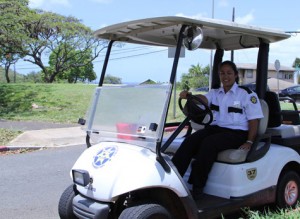Whether it’s on the University of Hawaiʻi Mānoa campus or Kapiʻolani Community College campus, it’s a common sight to see security guards patrolling the grounds.
From recent reports on the mainland of school shootings, and an escaped convict on the loose in February, how are students protected while on a college campus? And what can security do to help?
Currently, KCC has a contract with the Star Protection Agency for private security.. Bidding for contracted security is done by the University of Hawai‘i Community Colleges office. Students can expect to see the same contracted security company across all community colleges in the state.
In a PowerPoint prepared by Wayne Fredericks, security day shift supervisor at KCC, Fredericks shares who comprises KCC security. Campus security is staffed by the State Civil Service employees, and must pass an extensive pre-employment screening and background check, both provided by the State of Hawaiʻi attorney general’s office.
KCC also has state security staff, who are on duty Monday to Friday 6 a.m. to 10 p.m. excluding holidays. Security can be found patrolling all parking lots, buildings and KCC campus grounds. The grounds is comprised of land within Diamond Head Road, Makapuʻu, Kilauea and 18th avenues. They also patrol the old Cannon Club site, the Culinary Institute of the Pacific’s future home.
In February, murder suspect Teddy Munet escaped at Circuit Court. For several hours he was on the loose and was eventually was caught later that evening in downtown Honolulu, according to an article posted by KITV 4 news. This event caused several schools to lock down, including Central Middle and Royal Elementary according to an article published on HawaiiReporter.com.
In this type of situation, what happens on a college campus? Fredericks said if an escapee was in the immediate area, and they knew about it, access to campus would be minimized.
“We would focus our patrol towards the exterior campus … this is not a procedure, but it is what I would do if it happened today,” Fredericks wrote in an email correspondence.
Fortunately for KCC students, KCC is not located near any correctional facilities or near the courts downtown, he said.
Since the officers on campus are not armed, they act as a liaison between the school and law enforcement.
“As for lockdown procedures, like grade schools, locking down a campus like ours (KCC) is much more difficult,” Fredericks said. “We do not have a fenced perimeter and not all of our parking lot entrances are gated.”
If there were an active shooter situation, HPD officers’ responses are quick.
“KCC security maintains a great working relationship with the officers that work this sector or beat,” Fredericks wrote.
In an active shooter situation, students must respond when law enforcement arrive. Students should act according to the US Department of Homeland and Security information card: remain calm and follow instructions, put down all items in hands, raise hands spread fingers, keep hands visible at all times, avoid quick movements towards officers, avoid pointing screaming or yelling, do not ask for direction or help when being evacuated.
There are many other daily safety precautions students on campus can take, such as the calling for an escort to your car. Campus security has an escort service available if anybody is feeling unsafe, just call and a security guard will escort you to your car, or another area on campus.
Another common safety problem on campus is theft. Often times this happens when laptops and belongings are left unattended if a student goes to the restroom and returns and their items are gone. Fredericks reminds students to leave your belongings with someone your trust, and not to leave them unattended or unsecured.
Like KCC, UH Mānoa security calls the Honolulu Police Department depending on the situation for additional resources, said Campus Security Acting Chief Captain Alberta Pukahi. Pukahi said many of the approaches to situations are evaluated on a case-by-case basis.
Mānoa also alerts students of occurrences via the UH Alert System. Pukahi said in case of a “deranged” person near or on campus, students, faculty and staff are urged to stay away from that area until it is declared safe by HPD.
On all college campuses, it is recommended students keep their items secure and in sight, and to call for help if needed.
Fredericks’ PowerPoint provides several tips on how to respond to an active shooter situation:
-
Evacuate
-
Have a plan and escape route in mind
-
Leave your belongings behind
-
Keep your hands visible
-
-
Hide out
-
Hide in an area out of the shooters view
-
Block entry to your hiding place and lock doors
-
silence your cell phone or pager
-
-
Take action
-
Do this only as a last resort and your life is in imminent danger
-
Attempt to incapacitate the shooter
-
Act with physical aggression and throw items at the shooter
-
Need security?
Campus Security Escort Service: 734-9900

